#Lipoprotein
Text

RIP. Japanese biochemist Akira Endo, discover of cholesterol-lowering statin drugs, died on June 5, 2024 at age 90.
Statins, prevent heart attacks or strokes. It can help lower the level of LDL or the "bad cholesterol" in the blood and reduce the production of LDL inside the liver.
#lipoprotein #cholesterol #LDL #statins #cardiology
6 notes
·
View notes
Text
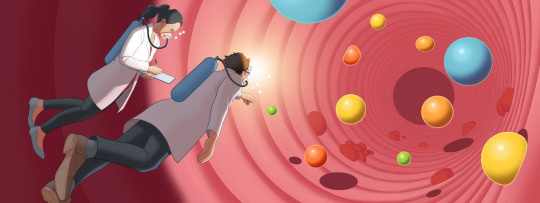
All About Cholesterol! The Latest Science on How Blood Levels of HDL, LDL and More Relate to Cardiovascular Health
— By Amber Dance | February 14, 2024
When C. Michael Gibson of Boston saw his doctor in the spring of 2023, the blood test results were confusing. His cholesterol levels were decent — he was already taking statins to keep the “bad” cholesterol low — but the arteries delivering blood to his heart were nonetheless crammed with dangerous plaque. “It didn’t make sense,” says Gibson, himself a cardiologist at Beth Israel Deaconess Medical Center.
So Gibson asked his physician to check his blood for a specific kind of cholesterol called lipoprotein(a). And there was the explanation: He had more than double the normal amount of that cholesterol. Gibson turned out to be one of the unlucky people who has inherited a predisposition toward high lipoprotein(a) levels; he suspects that his grandfather, who died of a heart attack at age 45, had it too.
About one in five people have this unfortunate heritage, and there’s nothing they can do to combat it — but soon that might change. Scientists are researching medications that can lower lipoprotein(a), as well as other approaches that could slash the risk of cardiovascular disease more than drugs like statins can.
Statins, approved in the late 1980s to lower levels of low-density lipoprotein (LDL) cholesterol, have been a lifesaving tool: They cut risk of heart attack and stroke by up to 50 percent for the more than 200 million people globally who take the medications. Yet even statin takers still get heart disease, and some still die. Cardiovascular disease remains the leading cause of death in the United States and across the world. Clearly, something’s been missing from the cholesterol picture.
The picture coming into focus today incorporates not just bad, LDL cholesterol and good, high-density lipoprotein (HDL) cholesterol, but also lipoprotein(a) and a poorly understood substance called “remnant cholesterol.” Medical researchers aim to minimize all of these except HDL. And HDL cholesterol itself, though it’s still understood to be beneficial, has turned out to be more complex than anticipated. Various attempts to raise HDL levels haven’t improved people’s health beyond what statins already achieve.
Yet despite this and other disappointments in which medicines haven’t panned out as expected, many researchers feel optimistic about treatments currently in clinical trials. “It’s really an exciting time,” says Stephen Nicholls, a cardiologist at Monash Health in Melbourne, Australia.
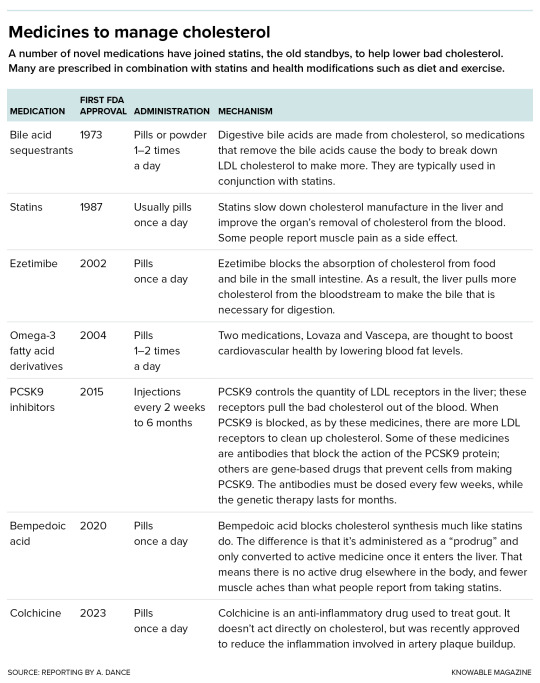
The list of drugs used to address high LDL cholesterol is growing.
LDL Cholesterol
Though it gets a bad rap among the health-conscious, cholesterol plays important roles in our body: It helps to control the stability and fluidity of cell membranes and is an important starting ingredient for making hormones such as testosterone and estrogen. What matters for our health is the company that the cholesterol molecule keeps when it travels.
Its waxy nature means it can’t mix well with water, so it can’t pass through the bloodstream on its own: Lone cholesterol molecules would separate out, like oil does in water. Cholesterol’s solution is to join up with complexes of proteins and fats, called lipoproteins, that carry it around. These lipoprotein carriers include LDL, HDL and other types. Cholesterol, in addition to being cargo, is a structural part of these carriers, too.
Lipoproteins are made in the gut and liver, and they deliver cholesterol and fat to body tissues. Fat goes to muscles, to be used for energy, or to fat tissue for storage. Cholesterol is dropped off in tissues to be incorporated into cell membranes or made into hormones. Cholesterol can also be returned to the liver where it can be stored, incorporated into new lipoproteins, turned into bile acids used by the digestive system to break down fats, or sent to be excreted.
When the delivery particles from the liver have dropped off most of their fats, they become LDL particles, which are still jam-packed with cholesterol. The problem happens when these LDL particles, instead of returning to the liver to be recycled, squeeze into blood vessel walls and get chemically modified. There, they incite or exacerbate an immune reaction called inflammation. In response, immune cells come in to eat LDL particles — but if they eat too much, they can get stuck in the blood vessel wall. This forms the beginnings of an atherosclerotic plaque.
Over time, that plaque accumulates more cholesterol, more fat and more immune cells, reducing the space through which blood can flow and deliver oxygen to tissues. If a plaque limits blood supply to the heart, it might cause chest pain called angina. A plaque might also lead to formation of a blood clot, which may break off and clog vessels elsewhere. The clot might cause a stroke in the brain, for example, or a heart attack.
Today, it’s clear that the less LDL cholesterol in the bloodstream, the better. Statins are good at achieving this, cutting LDL cholesterol levels by up to about half. And for those who need a bigger effect, or who can’t tolerate statins (muscle pain or weakness is an occasional side effect), there are newer medicines. “We now have the ability to get almost anyone’s LDL cholesterol down into the range that we would consider appropriate,” says Steven Nissen, a cardiologist at the Cleveland Clinic in Ohio.
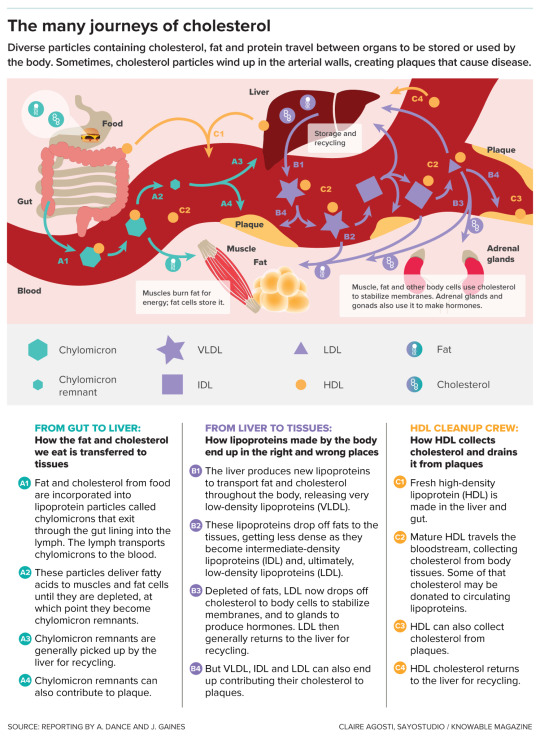
As cholesterol moves around the body within various protein- and fat-containing particles, it aids in important functions but also has the potential to create health risks.
Lipoprotein(a)
But these LDL-cholesterol treatments generally don’t do much against levels of lipoprotein(a), pronounced “lipoprotein-little-a.” This substance, composed of LDL cholesterol particles plus an extra protein, apolipoprotein(a), is mysterious: Scientists don’t know what its natural job is, though since apolipoprotein(a) has some similarity to a protein involved in blood clotting, it might have a role in wound healing. But it can’t be all that important to animal survival: Weirdly, the gene that carries instructions for making apolipoprotein(a) is found only in certain primates. (A similar gene evolved in hedgehogs.)
It’s also unclear why lipoprotein(a) is such a bad version of cholesterol, but it’s clearly up to no good much of the time. It delivers cholesterol to the blood vessel walls like LDL does, promotes blood clotting that blocks arteries and can cause inflammation and increase the risk of clots. And if your lipoprotein(a) is high — too bad. “Statins won’t get it down,” laments Gibson. “Exercise doesn’t get it down. Diet doesn’t get it down.”
Some of the newer LDL cholesterol-lowering drugs can reduce lipoprotein(a) cholesterol a bit, but probably not enough to significantly reduce cardiovascular risk, says Anand Rohatgi, a cardiologist at the University of Texas Southwestern Medical Center in Dallas. The only thing physicians can do, in extreme cases, is to regularly administer a blood-cleaning procedure called apheresis to remove lipoprotein(a).
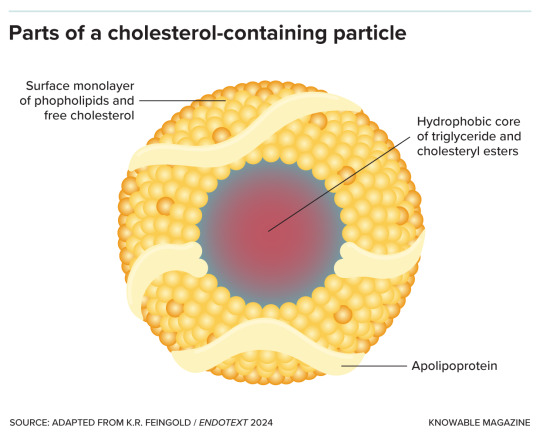
Lipoprotein particles are made up of a core containing fat in the form of triglycerides and cholesterol in the form of cholesteryl esters, surrounded by phospholipids, free cholesterol molecules and apolipoprotein.
For a long time, doctors ignored lipoprotein(a). “Nobody measured it, because you could not do anything about it,” says Prakriti Gaba, a cardiologist at Brigham and Women’s Hospital in Boston. That may be about to change now that several groups are testing medicines that target the substance. (Gaba got her own levels checked at a cardiology conference, where booths offering free tests have sprung up recently.)
Many of these experimental medications use genetic technology to silence the apolipoprotein(a) gene. In a handful of small studies, involving dozens to a few hundred subjects each, different apolipoprotein(a)-silencing therapies cut lipoprotein(a) levels by varying levels, from no change up to 92 percent. But it isn’t yet known whether cutting lipoprotein(a) will actually reduce cardiovascular problems. “We won’t know for a while,” says Leslie Cho, a cardiologist at the Cleveland Clinic who’s coleading one of the trials.
Cho’s HORIZON study, the farthest along, is testing a lipoprotein(a)-gene-silencing treatment compared to a placebo in more than 8,300 people with high lipoprotein(a) and a history of heart problems such as heart attack or stroke. The hope is that reducing lipoprotein(a) will decrease the rate of heart attacks, strokes, need for a medical procedure to improve blood flow, and death, but HORIZON isn’t expected to have results until 2025. Another trial that Gaba is involved in, called OCEAN(a)-Outcomes, is testing a similar approach in about 6,000 people, but is not expected to be completed until the end of 2026.
HDL Cholesterol
Just as lipoprotein(a) and LDL cholesterol are known as the baddies, HDL cholesterol has long been considered a good guy. HDL particles are thought to help by sucking cholesterol out of plaques. The HDL then takes this cholesterol to the liver for recycling or disposal. It’s the cardiovascular system’s cholesterol “garbage truck,” says Bob Eckel, a retired cardiometabolic physician and professor emeritus at the University of Colorado Anschutz Medical Campus.
If high levels of HDL cholesterol are good, scientists reasoned, then more of this cleanup crew should be even better. Exercising and weight loss can both raise HDL cholesterol. Scientists have tried to do the same with medications — but with disappointing results. The drugs did raise HDL cholesterol levels, yes, but they didn’t save lives in people already on statins, and they were weaker than statins at stopping heart attacks and strokes. “To sum it up very simplistically, approaches to raise HDL failed. Nothing really worked,” says Anatol Kontush, a lipid biochemist at the Sorbonne University in Paris.
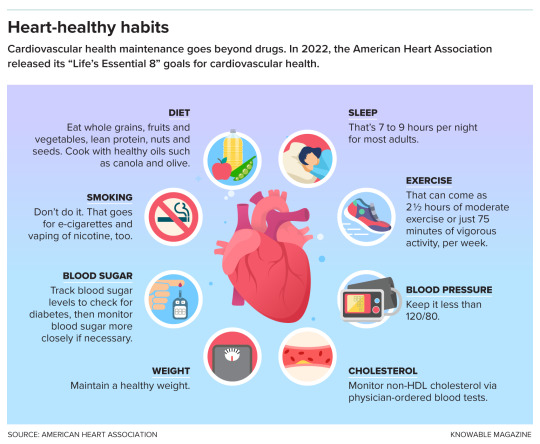
Lifestyle changes can help to reduce the risk of heart disease.
It’s not entirely clear why raising HDL cholesterol in statin-takers bombed. It might be that the idea of boosting HDL cholesterol was simply wrong. High HDL cholesterol might be a marker for good cardiovascular health, rather than a direct cause of it, says Rohatgi. If so, artificially amplifying its levels wouldn’t help.
But the problem also might have been an overly simplistic understanding of HDL cholesterol. Scientists now know that HDL comes in many types and can do many jobs. In addition to hoovering up cholesterol from plaques, it can fight inflammation — that’s good. But sometimes, HDL can turn bad and promote inflammation instead, Cho says, though it’s not clear how. And, she adds, people who are genetically wired to make too much HDL cholesterol can have an enhanced risk for heart disease.
The problem, then, may be that various drugs meant to amplify HDL cholesterol focused on quantity over quality, and increased the wrong kind of HDL. For example, one promising category of drugs raised HDL levels by inhibiting an enzyme that transfers cholesterol away from HDL particles, giving it to LDL particles. Several studies found these inhibitors failed to improve heart health. It might be that stopping the transfer of cholesterol away from HDL particles means the particles had less capacity to pick up new cholesterol from plaques, leaving the cholesterol to languish there. In other words, these garbage trucks were already full.
So the new plan, a last-ditch effort to save lives with HDL, is to help HDL do its cholesterol-removal job better, rather than to just make more of it. Gibson, for example, is chairing a clinical trial of a medicine called CSL112. It’s made of the key protein component of HDL particles — that is, it’s the starting material for HDL particles but still empty of cholesterol. These CSL112 molecules seem to work by creating new HDL molecules primed to pack in as much cholesterol as they can possibly hold. In a preliminary study of more than 1,200 people, two-thirds of whom received CSL112 infusions, the treatment was safe. And when the scientists took blood samples for lab tests, they found that the higher the dose of CSL112 participants received, the more their blood was able to suck up cholesterol.

Depending on their composition, lipoprotein particles can be of different sizes and densities, from small and dense like HDL to large and less dense like chylomicrons and VLDL.
In another study called AEGIS-II, the researchers tested CSL112 infusions in a larger group of people who had just suffered a heart attack and could be most likely to benefit from treatment. Following 18,200 people for a year, it asked whether CSL112 prevents second heart attacks, strokes and death in this population. “That’s a really big, definitive study, and if that doesn’t work, then I suspect the field will completely abandon HDL,” said Nicholls some months back.
In mid-February, CSL of King of Prussia, Pennsylvania — CSL112’s makers — announced that the study did not achieve its main goal of reducing major cardiac events such as stroke, heart attack or death. The researchers are still analyzing the data and will present results in more depth at the American College of Cardiology conference in April.
Triglycerides
If the HDL waters seem murky, the situation with triglycerides, the fatty component of blood that’s carried around in lipoprotein particles, is muddier still. The amount a person has depends on lifestyle: diet, exercise and so on. High triglycerides are linked to a greater risk for cardiovascular disease, and very high levels can lead to inflammation of the pancreas, known as pancreatitis. Thus, it made sense to posit that getting rid of triglycerides would be a healthy thing to do, and many studies have attempted just that — with boggling results.
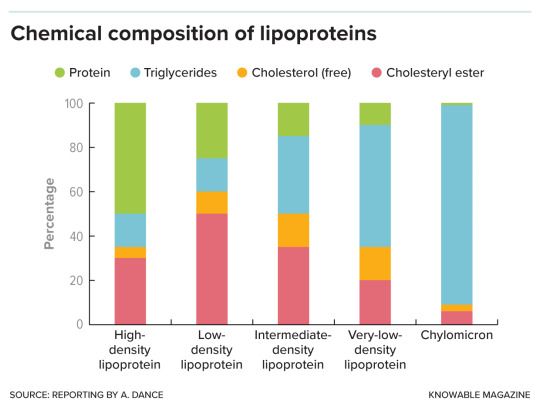
Lipoproteins are made up of protein, fat in the form of triglycerides, and cholesterol — both free cholesterol and a chemically modified, cholesteryl ester, form. The proportion of each varies with lipoprotein type.
One top candidate to reduce triglycerides is based on fish oil, which is high in the omega-3 fatty acids eicosapentaenoic acid (EPA) and docosahexaenoic acid (DHA). Diets rich in fatty fish or omega-3s have long been linked to lower rates of cardiovascular problems. The fish or fish oil supplements are thought to work by cutting down on fat production by the liver.
So, in a study called REDUCE-IT, researchers tested a highly purified derivative of EPA in more than 4,000 people with cardiovascular disease or diabetes. They compared these patients to a similar number of people who received inert mineral oil as a placebo.
At first glance, the results reported in 2019 looked “really spectacular,” says Nicholls, who wasn’t involved in the trial. In the group that had taken the EPA for about five years, risk of major cardiovascular problems or death dropped by 25 percent or more compared to those getting a placebo. But oddly, this benefit came without a big reduction in the triglycerides themselves.
In other words, “if EPA is working, it’s doing something other than lowering triglycerides,” says Kenneth Feingold, an endocrinologist and emeritus professor of medicine at the University of California, San Francisco. EPA might counter inflammation, for example, or stabilize the membranes of heart cells.
Based on the REDUCE-IT results, the US Food and Drug Administration approved the purified EPA derivative in 2019 as a medicine for people with high triglycerides and other cardiovascular risk factors. But things got more confusing in 2020, when Nicholls, Nissen and colleagues published another trial, called STRENGTH. This study also aimed to lower triglycerides in high-risk patients, about 6,500 of them, using EPA plus DHA. The researchers compared these patients to people who received a corn oil placebo. But the team halted their study early because, although triglyceride levels did fall, EPA plus DHA didn’t seem to have any beneficial effect on the rate of heart attack, stroke, hospitalization for heart problems, or death.
Researchers are still debating why REDUCE-IT hit paydirt but STRENGTH faltered. Looking back at REDUCE-IT, some experts see a problem with the mineral oil placebo that was used. LDL cholesterol levels and signs of inflammation went up in that group — and if the control participants were worse off than if they’d received nothing at all, then their data would make the experimental treatment look better than it really is.
But Gibson, who was part of the REDUCE-IT team, argues for a different explanation: that pure EPA is better than the EPA/DHA combo. And supporting REDUCE-IT’s conclusions, he points to an older, 1990s study that compared people taking EPA plus statins with people taking statins alone and also found fewer major coronary events in the EPA group.
Then, in 2022, came the latest blow to the once-promising idea of lowering triglycerides: the PROMINENT trial, in which Eckel and colleagues tested a drug called pemafibrate that reduces blood triglycerides. The 10,000-plus study participants had type 2 diabetes, high triglycerides and low HDL, and were at risk for cardiovascular events. But even though triglyceride levels fell by about 26 percent, on average, in the group receiving the drug, this made no difference to the rate of cardiovascular events.
Taken together, the results suggest that triglycerides indicate poor cardiovascular health without being the reason behind the problem. “Triglycerides were just innocent bystanders,” concludes Eckel. The exception, he adds, might be people with very high triglycerides who are at risk of pancreatitis and might still benefit from triglyceride-lowering treatment.
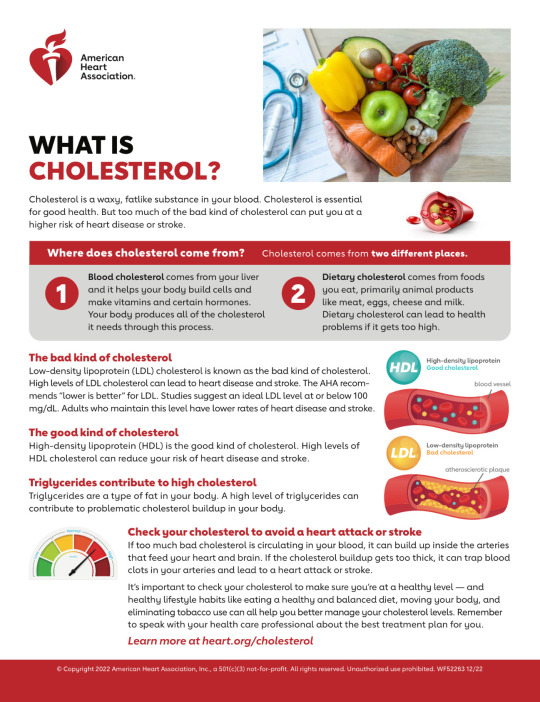
Remnant Cholesterol
This is a loosely used term, with science still to be settled. In the doctor’s office, physicians assume that any cholesterol that isn’t HDL or LDL is a leftover or “remnant” fraction. From a molecular point of view, remnant cholesterol is a fat-delivering lipoprotein in an intermediate state: It left the liver, loaded with fat and cholesterol, and has dropped off some of its triglycerides in the body’s tissues, but not so much of its cargo that it’s become an LDL lipoprotein. Chylomicrons from the gut, once depleted of fats, also become remnant particles.
In people with healthy metabolisms, the body quickly disposes of remnant particles. But if a person has a problem such as diabetes or obesity, these fatty remnants might stick around. Remnant cholesterol may accumulate in atherosclerotic plaques, potentially making it as dangerous as the classic bad LDL cholesterol. Indeed, high levels of remnant cholesterol have been linked to cardiovascular disease in some studies, quite independently of patients’ LDL cholesterol measurements. That suggests that getting rid of those remnants could be beneficial.
The substances remain a bit of a black box, though. “We still don’t know precisely how to define them, we don’t know precisely how to measure them, so it’s kind of difficult to be precise about remnants,” says Feingold. Nonetheless, some researchers are interested in treatments that might target remnants in addition to, or instead of, triglycerides. For example, Nicholas Marston, a cardiologist at Brigham and Women’s, and colleagues are testing a medication called olezarsen that, he says, appears to promote clearance of the cholesterol-carrying particles. But it will take more study to learn if that translates into fewer cardiovascular problems.
Remnant cholesterol is “probably important,” says Nissen — so even though the science is still nascent, he says he feels hopeful about the potential of treatments targeting it.
In sum, the emerging picture is one in which certain forms of HDL cholesterol are good and all the other lipoproteins are bad. The best approach, experts suggest, may be to reduce all the non-HDL cholesterol — whether by diet and exercise or some of these new medicines, should they prove effective.
“If it’s not HDL, we should minimize it,” says Feingold. “The lower, the better.”
— Editor’s Note: This article was amended February 15, 2024, to add the preliminary results of the AEGIS-II trial aimed at raising levels of HDL and to remove a speculative quote about the ramifications of a positive result from the trial.
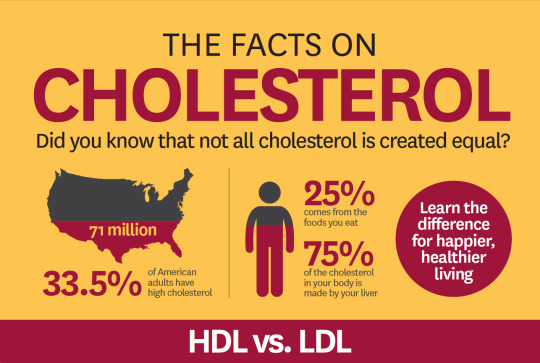
#Source: KnowledgeMagazine.Org#Cholesterol#Latest Science#Blood Levels of HDL | LDL#Cardiovascular 🫀 Health#Medicines to Manage#Lipoprotein#Triglycerides#Remnant Cholesterol
0 notes
Text
What Is The Lipid Profile Test Used For?
A lipid profile measures the levels of cholesterol and other fats in your blood. It is used to screen for, diagnose, and monitor heart disease and other health conditions.
0 notes
Text
Die Risikofaktoren für Herz-Kreislauf-Erkrankungen sind bei Frauen und Männern weitgehend gleich, wie eine Studie zeigt
Bei Frauen und Männern sind die Risikofaktoren für Herz-Kreislauf-Erkrankungen weitgehend gleich, wie eine umfassende globale Studie unter Beteiligung der Universität Göteborg zeigt.
Die jetzt in The Lancet veröffentlichte Studie umfasst Teilnehmer sowohl aus Ländern mit hohem als auch aus Ländern mit mittlerem und niedrigem Einkommen. Herz-Kreislauf-Erkrankungen sind bei letzteren häufiger…
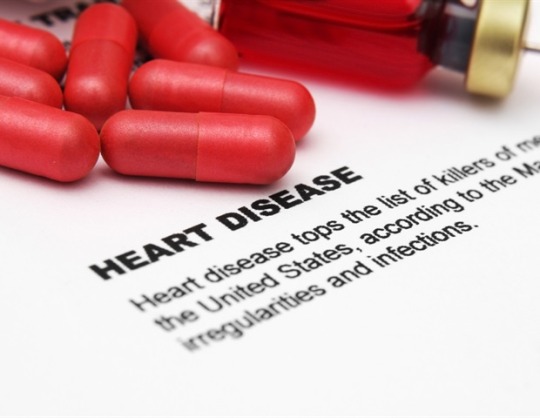
View On WordPress
#BLUT#Blutdruck#Bluthochdruck#Cholesterin#Depression#Diabetes#Diät#Fettleibigkeit#Herz#Herzinfarkt#Herzinsuffizienz#Herzkreislauferkrankung#Leber#Lipoprotein#Medizin#Östrogen#Rauchen#Schlaganfall#Tabak
0 notes
Photo

Blood lipid analysis ! Have you checked out your blood lipid and it’s viscosity ? Why lipoprotein HDL in your blood is important ? Do you know there is a relationship between your blood lipid and heart health ? If you want to keep your heart healthy , you need to make sure your blood lipid is in balance . Balancing blood lipid is possible with correct diet and exercise . I am a holistic health doctor and can help you with my unique solutions to improve your health health with all natural effective solutions. You can improve your life quality while helping your heart ❤️ with holistic health approach. The younger you are the more effective holistic health solutions you can feel . 🌈To learn more, follow @sharingnaturaly ❤️Save and share it with your friends who need improve heart health . #heart #hearthealthy #hearthealthyfood #hearthealthyrecipes #lipids #lipidbalance #hdl #lipoprotein #holistichealth #naturalhealth #holistichealthdoctor #holistichealingdoctor #newportbeachca#holistichealthcare (at Newport Beach, California) https://www.instagram.com/p/CjY_rnPrjWu/?igshid=NGJjMDIxMWI=
#heart#hearthealthy#hearthealthyfood#hearthealthyrecipes#lipids#lipidbalance#hdl#lipoprotein#holistichealth#naturalhealth#holistichealthdoctor#holistichealingdoctor#newportbeachca#holistichealthcare
0 notes
Text

fascinating scanner smear (?) on this nasa pdf about death from explosive decompression that i looked up because i was trying to figure out whether the thing about your eyes exploding when exposed to the vacuum of space is termed apoplexy or not because i wanted to toss an offhand remark about how i hope the wealthy die in space before they experience overview (you can't find apoplexy used in that context in this pdf but it can be. not just specifically your eyes. basically all of your organs explode. if you were wondering. you know. like a blobfish)
#oh no now i'm down an irrelevant rabbithole. did you know depressurization may make your blood boil. denaturing lipoprotein complexes#which renders lipids insoluble. and makes the fat content of your blood 'drop out' (giertsen et al 1988)
16 notes
·
View notes
Text
Just realized I didn’t share…I‘ve been a bit on a health journey the last month.
Background: in my mothers family many people suffer from really high cholesterol levels even if young and normal weight. As my levels started to rise above normal a few years ago I was in limbo weather to take medication or not, I started on ‚red yeast rice‘ two years ago which helped good. Now the company selling these suddenly advices to only take one capsule a week instead of every day. I talked to a friend of mine who’s a GP and she suggested to test my Lipoprotein A (correlates with cardiovascular risk).
Went to my GP for checkup and bloodwork. Lipoprotein A is high -> I should take a Statin to lower my cholesterol levels further then the usual recommendation. He also recommended a 24h blood pressure reading. Which wasn’t great (it wasn’t horrible either but still off). So now I‘m on blood pressure medication and a statin. I didn‘t have any issues with turning 40 this year - but now I‘m feeling kind of old…
Also I‘m feeling how lucky I‘ve been. High Lipoprotein A also correlates with higher rates of miscarriage and pregnancy complications. I always thought LO‘s low birth weight (~2600g/5,7 pounds at 10 days before expected due date) was due to my high stress levels working during the pregnancy. But maybe the placenta just didn’t develop great. So happy that nothing else happened.
Hope I didn’t bore everyone too much with this. Just felt good to write it down.
5 notes
·
View notes
Text
https://bundas24.com/read-blog/136052_low-density-lipoprotein-ldl-test-market-size-analysis-and-forecast-2031.html
The Low Density Lipoprotein (LDL) Test Market in 2023 is US$ 9.11 billion, and is expected to reach US$ 14.88 billion by 2031 at a CAGR of 6.32%.
#Low Density Lipoprotein (LDL) Test Market#Low Density Lipoprotein (LDL) Test Market Share#Low Density Lipoprotein (LDL) Test Market Scope
0 notes
Text
Lipoproteins and cardiovascular risk: how t manage
What are lipoproteins?
Dietary lipids are digested within the gastrointestinal tract, following which they enter the intestinal mucosa to become chylomicrons, transporting triacylglycerols from food into the blood. Chylomicron breakdown in muscle or fat tissue yields chylomicron remnants for excretion by liver cells. Lipoproteins consist of lipids that are chemically attached to protein…
#apolipoprotein E#atherosclerosis#cardiovascular risk#cholesterol#chylomicrons#dyslipdemia#ezetimibe#hypercholesterolemia#inclisiran#lipoproteins#PCSK9#rosuvastatin
0 notes
Text
Cholesterol Level Varies With Age, Important For Healthy Living
0 notes
Text
Breakthrough Drug Achieves 65% Reduction in Genetic 'Bad Cholesterol'
For the first time, doctors may soon have a way to lower extremely high levels of a risky type of cholesterol known as lipoprotein(a), or Lp(a). This genetically-influenced cholesterol has long been untreatable, leaving many patients at heightened risk of heart disease. But thanks to a new breakthrough drug called muvalaplin, there is now hope for better controlling this “silent killer.”
Lp(a) is…
View On WordPress
#Cardiovascular Disease#cholesterol#familial hypercholesterolemia#Heart Disease#LDL#lipoprotein(a)#Lp(a)#muvalaplin#Stroke
0 notes
Text
Understanding High Cholesterol and Its Impact on Health: Recognizing the Importance of Early Symptoms
What is high cholesterol? Let’s understand
High cholesterol, a common yet significant health concern, continues to pose a considerable risk to public health. As a researcher, it is essential to shed light on this topic, explaining the concept of high cholesterol, its potential impact on overall health, and the critical importance of recognizing early symptoms. By understanding the implications…
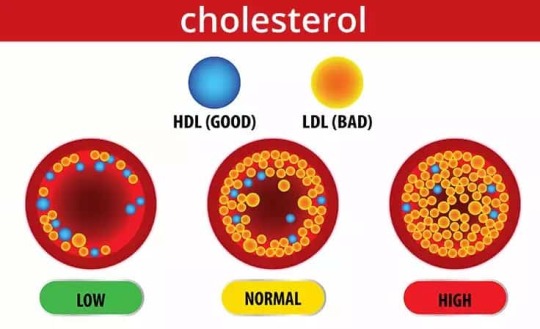
View On WordPress
#Causes of Types of Cholesterol#cholesterol#High cholesterol#High Cholesterol Treatment#High Density Lipoprotein Cholesterol#Low Density Lipoprotein Cholesterol#Medications for High Cholesterol#synptoms of High Cholesterol#Triglycerides#Types of Cholesterol#What is high cholesterol
0 notes
Text
Coronary Artery Calcification and Lipoprotein (a)
Coronary Artery Calcification and Lipoprotein (a)
by Jeffrey Dach MD
Sam is a 56 year old music conductor at the local symphony. Lately Sam has been having chest pain unrelieved by antacid drugs. His cardiologist did an evaluation showing that Sam has a high calcium score over 400, and elevated Lipoprotein (a), a genetic form of accelerated coronary artery disease.
What is Lipoprotein (a) Also…

View On WordPress
0 notes
Text
Die Risikofaktoren für Herz-Kreislauf-Erkrankungen sind bei Männern und Frauen weitgehend gleich
Bei Männern und Frauen sind die Risikofaktoren für Herz-Kreislauf-Erkrankungen weitgehend gleich, wie eine umfassende globale Studie unter Beteiligung von Forschern der Universität Göteborg zeigt.
Die jetzt in The Lancet veröffentlichte Studie umfasst Teilnehmer sowohl aus Ländern mit hohem als auch aus Ländern mit mittlerem und niedrigem Einkommen. Herz-Kreislauf-Erkrankungen sind bei letzteren häufiger anzutreffen. Die Daten stammen aus der Prospective Urban Rural...
#BLUT #Blutdruck #Bluthochdruck #Cholesterin #Depression #Diabetes #Diät #Fettleibigkeit #Forschung #Herz #Herzinfarkt #Herzinsuffizienz #Herzkreislauferkrankung #Leber #Lipoprotein #Medizin #Östrogen #Rauchen #Schlaganfall #Tabak
#Medical_Condition_News#Medical_Research_News#Mens_Health_News#News#Womens_Health_News#BLUT#Blutdruck#Bluthochdruck#Cholesterin#Depression#Diabetes#Diät#Fettleibigkeit#Forschung#Herz#Herzinfarkt#Herzinsuffizienz#Herzkreislauferkrankung#Leber#Lipoprotein#Medizin#Östrogen#Rauchen#Schlaganfall#Tabak
0 notes
Text

update: there is some problems on paypal’s side currently, we’re working on it, i apologise ;——; I’ll make sure to tell you once it’s all sorted out ;——-;
Hi everybody! I need your attention for a moment.
I have a very good friend whom i know now for two years, he’s a very caring, compassionate and gentle person and i care for him a lot.
He supported me when i needed the support and now i want to support him.
His name is Vadym, he’s from Ukraine, he has been suffering from serious health problems since 2019, but his condition has started to get worse sharply in recent months. It’s getting pretty bad and i am really scared for him.
He has a rare genetically determined disease - hyperlipoproteinaemia (severely elevated lipoprotein (a)). It affects blood vessels and organs dependent on them. As of today, the abdominal aorta, heart, kidneys, pancreas and the gastrointestinal tract in general are damaged.
He has completely lost his ability to work, he barely eats and requires a long-term treatment. In the coming weeks, a large set of instrumental and laboratory tests needs to be done, which my friend simply cannot pay for in his current condition. So I have to ask for your help. Now approx. $1,500 (60,000 hryvnias) should be raised. Any amount will be helpful, even a dollar.
PayPal: [email protected]
He’s a really great person and i really hope i’ll be able to help him.
List of all the laboratory tests he needs: https://docs.google.com/file/d/15GFbZ149gcDOvLp2Os8hc7D3kXwVq904/edit?usp=docslist_api&filetype=msexcel
Prices for his laboratory tests:
https://dila.ua/documents/price/060924/pricekyiv.xlsx
https://medikom.ua/price/
https://feofaniya.org/prices/
#chronically ill#disability#disabled#need help#need urgent help#urgent#furry#ukraine#help ukraine#hyperlipoproteinaemia#stand with ukraine
59 notes
·
View notes
Text
When it comes to cholesterol, it's usually sorted into the 'good' kind and the 'bad' kind based on their effects on heart health – but now a new study has shown that the 'good' type of cholesterol could have other health risks attached.
This is High-Density lipoprotein cholesterol (HDL-C), and the latest research links an abundance of it with a higher risk of dementia in older adults. For those above 75 years of age, the risk increases by 42 percent, the analysis showed.
Continue Reading.
97 notes
·
View notes